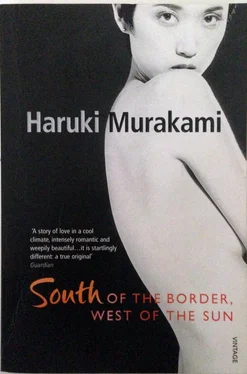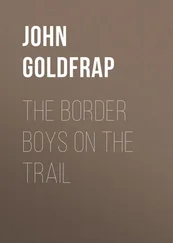“Shimamoto-san,” I said, “what do you say we go somewhere and listen to this together?”
“That would be wonderful,” she said.
“I have a small cottage in Hakone. It’s empty now, and there’s a stereo there. This time of night, we could drive there in an hour and a half.”
She looked at her watch. And then at me. “You want to go there now?”
“Yes,” I said.
She narrowed her eyes. “But it’s already past ten. If we went to Hakone now, it would be very late when we came back. Don’t you mind?”
“No. Do you?”
Once more she looked at her watch. And closed her eyes for a good ten seconds. When she reopened them, her face was filled with an entirely new expression, as if she’d gone far away, left something there, and returned. “All right,” she said. “Let’s go.”
I called to the acting manager and asked him to take care of things in my absence—lock up the register, organize the receipts, and deposit the profits in the bank’s night deposit box. I walked over to my condo and drove the BMW out of the underground garage. And called my wife from a nearby telephone booth, telling her I was off to Hakone.
“At this hour?” she said, surprised. “Why do you have to go all the way to Hakone at this hour?”
“There’s something I need to think over,” I said.
“So you won’t be back tonight?”
“Probably not.”
“Honey, I’ve been thinking over what happened, and I’m really sorry. You were right I got rid of all the stock. So why don’t you come on home?”
“Yukiko, I’m not angry at you. Not at all. Forget about that I just want some time to think. Give me one night, okay?”
She said nothing for a while. Then: “All right.” She sounded exhausted. “Go ahead to Hakone. But be careful driving. It’s raining.”
“I will.”
“There’s so much I don’t understand,” my wife said. “Tell me one thing: am I in your way?”
“Not at all,” I replied. “It has nothing to do with you. If anything, the problem’s with me. So don’t worry about it, okay? I just want some time to think.”
I hung up and drove to the bar. I could tell from Yukiko’s voice that she’d been mulling over our lunchtime conversation. She was tired, confused. It saddened me. The rain was still falling hard. I let Shimamoto into the car.
“Isn’t there someplace you need to call before we go?” I asked.
Silently she shook her head. And, as she did on the way back from Haneda Airport, she pressed her face against the glass and stared at the scenery.
There was little traffic on the way to Hakone. I got off the Tomei Highway at Atsugi and headed straight to Odawara on the expressway. I kept our speed between eighty and ninety miles per hour. The rain came down in sheets from time to time, but I knew every curve and hill along the way. After we got on the highway, Shimamoto and I said hardly a word. I played a Mozart quartet quietly and kept my eyes on the road. Shimamoto was lost in thought as she looked out the window. Occasionally she’d glance over at me. Whenever she did, my throat went dry. Forcing myself to relax, I swallowed a couple of times.
“Hajime,” she said. We were near Kouzu. “You don’t listen to jazz much outside the bar?”
“No, I don’t. Mostly classical music.”
“How come?”
“I guess because jazz is part of my job. Outside the club, I like to listen to something different. Sometimes rock too, but hardly ever jazz.”
“What type of music does your wife listen to?”
“Usually whatever I’m listening to. She hardly ever plays any records on her own. I’m not even sure if she knows how to use the turntable.”
Shimamoto reached over to the cassette case and pulled out a couple of tapes. One of them contained the children’s songs my daughters and I sang together in the car. “The Doggy Policeman,” “Tulip”—the Japanese equivalent of Barney’s Greatest Hits. From her expression as she gazed at the cassette and its picture of Snoopy on the cover, you’d think she’d discovered a relic from outer space.
Again she turned to gaze at me. “Hajime,” she said after a while. “When I look at you driving, sometimes I want to grab the steering wheel and give it a yank. It’d kill us, wouldn’t it.”
“We’d die, all right. We’re going eighty miles an hour.”
“You’d rather not die with me?”
“I can think of more pleasant ways to go.” I laughed. “And besides, we haven’t listened to the record yet. That’s the reason we’re here, right?”
“Don’t worry,” she said. “I won’t do anything like that. The thought just crosses my mind from time to time.”
It was only the beginning of October, but nights in Hakone were chilly. We arrived at the cottage, and I turned on the lights and lit the gas stove in the living room. And took down a bottle of brandy and two snifters from the shelf. We sat next to each other on the sofa, as we used to do so many years before, and I put the Nat King Cole record on the turntable. The red glow from the stove was reflected in our brandy glasses. Shimamoto sat with her legs folded underneath her. She rested one arm on the back of the sofa, the other in her lap. The same as in the old days. Back then she probably wanted to hide her leg, and the habit remained even now. Nat King Cole was singing “South of the Border.” How many years had it been since I heard that tune?
“When I was a kid and listened to this record, I used to wonder what it was that lay south of the border,” I said.
“Me too,” she said. “When I grew up and could read the English lyrics, I was disappointed. It was just a song about Mexico. I’d always thought something great lay south of the border.”
“Like what?”
Shimamoto brushed her hair back and lightly gathered it behind. “I’m not sure. Something beautiful, big, and soft.”
“Something beautiful, big, and soft,” I repeated. “Was it edible?”
She laughed. Her white teeth showed faintly. “I doubt it.”
“Something you can touch?”
“Probably.”
“Again with the probablys.”
“A world full of probablys ,” she said.
I stretched out my hand and laid it on top of her fingers on the back of the sofa. I hadn’t touched her body for so very long, not since the plane ride back from Ishikawa. As my fingers grazed hers, she looked up at me briefly, then down again.
“South of the border, west of the sun,” she said.
“West of the sun?”
“Have you heard of the illness hysteria siberiana?”
“No.”
“I read this somewhere a long time ago. Might have been in junior high. I can’t for the life of me recall what book I read it in. Anyway, it affects farmers living in Siberia. Try to imagine this. You’re a farmer, living all alone on the Siberian tundra. Day after day you plow your fields. As far as the eye can see, nothing. To the north, the horizon, to the east, the horizon, to the south, to the west, more of the same. Every morning, when the sun rises in the east, you go out to work in your fields. When it’s directly overhead, you take a break for lunch. When it sinks in the west, you go home to sleep.”
“Not exactly the lifestyle of an Aoyama bar owner.”
“Hardly.” She smiled and inclined her head ever so slightly. “Anyway, that cycle continues, year after year.”
“But in Siberia they don’t work in the fields in winter.”
“They rest in the winter,” she said. “In the winter they stay home and do indoor work. When spring comes, they head out to the fields again. You’re that farmer. Imagine it.”
“Okay,” I said.
“And then one day, something inside you dies.”
“What do you mean?”
Читать дальше












